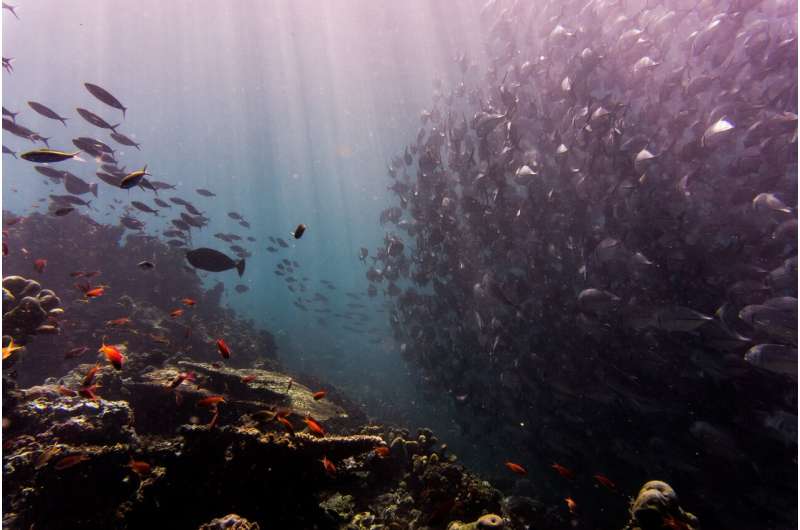This article has been reviewed according to Science X's editorial process and policies. Editors have highlighted the following attributes while ensuring the content's credibility:
fact-checked
peer-reviewed publication
trusted source
proofread
First global estimate of marine aquarium trade to encourage sustainable practices

New research has generated the first global estimate of the number of fish and invertebrates within the Marine Aquarium Trade (MAT), as a way to incentivize industry sustainability and coral reef conservation.
Every year 55 million organisms are sold—worth $2.15bn at retail—placing the MAT on par with global fisheries, such as tuna, in terms of economic significance.
The paper, published in Science Advances, estimates there are currently over 8,000 retailers globally and 6.7 million marine hobbyists. This number is expected to increase to 45 million by 2100 based on population increases and as countries increase their wealth.
Species traded for aquariums are worth more money per kilogram, compared to fish for food. For example, the average price achieved by the fishers for the MAT is $148 per kg, whereas tuna is $3 per kg.
More than 25% of all known marine species—including high-value fish and organisms—are found on coral reefs. These ecosystems are crucial to millions of people as they provide a quarter of all the fish caught by developing countries that border the reefs.
However, scientists warn the aquarium trade is at a crossroads forced by threats from global climate change and other stressors.
Lead author, Professor Gordon Watson from the University of Portsmouth's School of Biological Sciences, said, "We know that MAT puts stress on key habitats, but it can also help stimulate enthusiasm for marine conservation, and it is a valuable source of income for many communities. Aquariums are a great way to educate people about how critical coral reefs are to a healthy and productive planet."
This paper estimates there are around 500 species being regularly traded in the MAT; 210 fish, and 296 inverts. Twenty-five were identified as being at extremely high risk of being overfished, including species of snails, hermit crabs, and the Bangaii cardinal fish. Indonesian and Sulu-Celebes Seas are the areas most exploited.
"The Marine Aquarium Trade is a hugely valuable industry that has the leverage to generate change, providing a framework for fishers and governments to protect reefs, and as a result the communities that rely on them," added Professor Watson.
"But data gaps are amplifying demands for an international ban on the trade. Our study goes some way to fill in these gray areas."
Despite a growing awareness of the environmental impacts of the MAT, the authors warn if nothing changes it will transform into an aquaculture-dominated industry. This would see species farmed away from the reefs and associated coastal communities who rely on them to sustain their economy, or moving to more destructive methods of fishing.
Professor Watson said, "The trade finds itself at a crossroads with near-future governance decisions being critical for its long-term future. These choices can be distilled into a 'business-as-usual' approach or a 'MAT positive' one."
The study has outlined a number of ways the MAT can become more sustainable:
- Species stock assessment of those most at risk and put in stock management
- Address mortality in the chain of custody
- Support local coral reef protection and restoration programs
- Governance structures needed, similar systems to the tuna
- Successful introduction of the Fairtrade/MSC certification-style system to help implement these things
The paper concludes by saying a 'MAT-positive' future is imaginable, but requires real action on climate change, evidence-based management, consumer education, sustainable practice incentivization, and over-exploitation assessments to ensure that the MAT becomes a 'force-for-good' and paradigm of sustainable coral reef fisheries.
More information: Gordon J. Watson et al, Can the global marine aquarium trade (MAT) be a model for sustainable coral reef fisheries?, Science Advances (2023). DOI: 10.1126/sciadv.adh4942
Journal information: Science Advances
Provided by University of Portsmouth


















